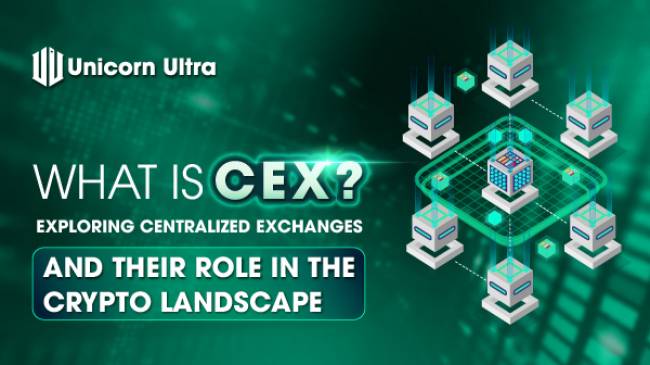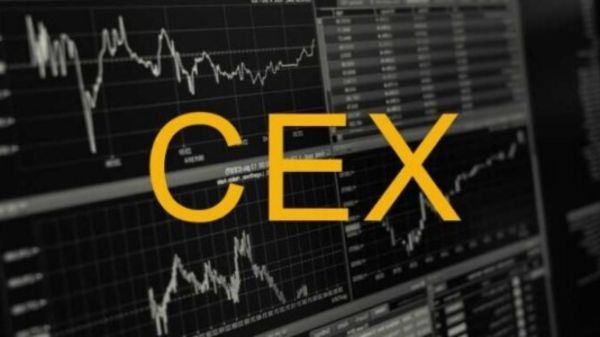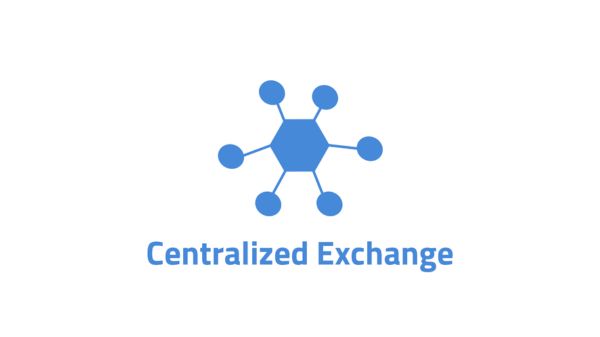In the fast-paced world of cryptocurrencies, various types of exchanges facilitate the buying, selling, and trading of digital assets. One popular type of exchange is the Centralized Exchange, commonly referred to as CEX. This blog post aims to shed light on what is CEX, CEX meaning crypto how they work, their important traits, benefits, challenges, how you can use them, and whether they are suitable for your crypto journey.
Table of Contents
What is CEX?
What is CEX? A Centralized Exchange - CEX meaning crypto is a platform that acts as an intermediary between buyers and sellers of digital assets. It operates as a trusted third party, holding users' funds and facilitating the execution of trades. CEXs are owned and operated by a centralized entity, which controls the exchange's operations, security measures, and user interface.

Working of Centralized Exchanges
CEXs work by matching buy and sell orders from users, maintaining order books, and executing transactions. When a user places a buy or sell order, the exchange's software matches it with the opposite order to facilitate the trade. CEXs typically charge transaction fees for executing trades and may offer additional services such as margin trading and advanced order types.
Important Traits of Centralized Exchanges
- Liquidity: CEXs often have high liquidity, meaning there is a significant volume of buyers and sellers, allowing for easy and quick trades.
- Security: Centralized exchanges implement security measures to protect user funds, such as two-factor authentication (2FA), encryption, and cold storage for offline asset storage.
- Regulation and Compliance: CEXs operate under regulatory frameworks and adhere to Know Your Customer (KYC) and Anti-Money Laundering (AML) policies, providing a level of trust and transparency.

Benefits of CEXs
- User-Friendly Interface: CEXs offer intuitive interfaces, making it easier for newcomers to navigate and participate in the crypto market.
- High Liquidity: The large user base and trading volume of CEXs result in high liquidity, enabling users to buy or sell assets quickly and at competitive prices.
- Fiat Support: Many CEXs allow users to deposit and withdraw fiat currencies, making it convenient for users to convert between cryptocurrencies and traditional money.
- Trading Tools and Features: CEXs often provide advanced trading features, including market orders, limit orders, stop-loss orders, and margin trading, catering to both beginners and experienced traders.
Challenges of CEXs
- Centralization Risks: Since CEXs are centralized, they are vulnerable to security breaches, hacks, and potential misuse of user data. Users must trust the exchange with their funds, which goes against the decentralized ethos of cryptocurrencies.
- Limited Anonymity: Due to regulatory requirements, CEXs often require users to provide personal identification information, compromising the anonymity associated with cryptocurrencies.
- Operational Risks: CEXs can experience technical issues, server outages, or even temporary suspensions, leading to disruptions in trading activities.

The most prestigious CEX
As of my knowledge cutoff in September 2021, some of the most prestigious centralized cryptocurrency exchanges (CEXs) known for their reputation, security, and global reach include:
- Binance: Binance is one of the largest and most well-known cryptocurrency exchanges globally. It offers a wide range of trading options, including spot trading, futures trading, and a diverse selection of cryptocurrencies. Binance has a strong focus on security and offers various features and services to cater to both retail and institutional traders.
- Coinbase Pro: Coinbase Pro is the professional trading platform offered by Coinbase, one of the most recognized and regulated cryptocurrency exchanges in the United States. Coinbase Pro provides advanced trading features, liquidity, and a user-friendly interface. Coinbase is known for its regulatory compliance and emphasis on security.
- Kraken: Kraken is a reputable cryptocurrency exchange based in the United States, offering trading services for a wide range of cryptocurrencies. It has a robust trading platform, competitive fees, and a strong focus on security and regulatory compliance. Kraken has been in operation since 2011 and is known for its solid reputation.
- Bitstamp: Bitstamp is one of the oldest cryptocurrency exchanges and is based in Luxembourg. It offers trading services for various cryptocurrencies and provides a user-friendly interface, advanced trading features, and high liquidity. Bitstamp has a strong reputation for security and regulatory compliance.
- Gemini: Gemini is a regulated cryptocurrency exchange founded by the Winklevoss twins. It operates in the United States and offers a secure platform for buying, selling, and trading cryptocurrencies. Gemini places a significant emphasis on regulatory compliance and provides services for both retail and institutional investors.
It's important to note that the cryptocurrency landscape is dynamic, and the perceived prestige of exchanges can change over time. New exchanges may emerge, and existing exchanges may evolve their offerings. Therefore, it's always advisable to conduct thorough research, consider factors such as regulatory compliance, security measures, available trading pairs, user experience, and reputation before choosing a cryptocurrency exchange.
How to choose the right CEX?
Choosing the right centralized cryptocurrency exchange (CEX) requires careful consideration of several factors. Here are some key considerations to help you choose the right CEX for your needs:
- Security: Security should be a top priority when selecting a CEX. Look for exchanges that employ robust security measures such as two-factor authentication (2FA), cold storage for user funds, regular security audits, and transparent communication about their security practices. Research the exchange's track record regarding past security incidents and how they handled them.
- Regulatory Compliance: Consider whether the exchange operates in a regulated jurisdiction and complies with relevant laws and regulations. Regulated exchanges often prioritize customer protection and are more likely to have established compliance measures in place, including Know Your Customer (KYC) and Anti-Money Laundering (AML) procedures.
- Reputation and Track Record: Research the exchange's reputation and track record in the industry. Look for user reviews, testimonials, and feedback from the community. Consider factors such as the exchange's longevity, its trading volume, and its response to critical incidents or customer support issues.
- Available Cryptocurrencies and Trading Pairs: Assess the range of cryptocurrencies and trading pairs offered by the exchange. Ensure that the exchange supports the specific cryptocurrencies you intend to trade. Additionally, consider the availability of fiat currency trading pairs if you plan to deposit or withdraw funds using traditional currencies.
- Liquidity and Trading Volume: High liquidity and trading volume are important for efficient trading. Exchanges with higher liquidity offer tighter spreads and lower slippage, providing better trading opportunities. Check the exchange's trading volume and order book depth to gauge its liquidity.
- User Experience and Interface: Evaluate the exchange's user interface and overall user experience. Look for an intuitive and user-friendly platform that suits your trading style. Features like advanced charting tools, order types, and trading options can also be important considerations.
- Fees and Trading Costs: Review the fee structure of the exchange, including trading fees, deposit and withdrawal fees, and any additional charges. Some exchanges offer tiered fee structures based on trading volume, which may be beneficial if you plan to trade frequently or with larger volumes.
- Customer Support: Consider the quality and availability of customer support. Look for exchanges with responsive customer support channels, such as live chat, email support, or a dedicated support ticket system. Prompt and helpful customer support can be crucial, especially during critical situations or when encountering technical issues.
- Mobile Support: If you prefer trading on the go, check if the exchange offers a mobile application or has a responsive mobile-friendly website. Mobile support can be important for convenient trading and portfolio management.
- Geographical Restrictions: Ensure that the exchange operates in your geographical region and supports users from your country. Some exchanges have restrictions or limitations on certain jurisdictions due to regulatory requirements.
Remember to conduct thorough research, compare multiple exchanges, and consider your specific trading requirements and preferences before choosing a CEX. It's advisable to start with smaller deposits and gradually increase your engagement to assess the exchange's performance and reliability.
How to buy, sell and trade on CEX?
To buy, sell, and trade on a centralized cryptocurrency exchange (CEX), you can follow these general steps:
- Sign up and Create an Account: Visit the CEX's website and sign up for an account. Provide the necessary information, complete any verification processes (such as KYC), and set up two-factor authentication (2FA) for added security.
- Deposit Funds: Once your account is set up, navigate to the deposit section of the exchange's platform. Select the cryptocurrency or fiat currency you want to deposit. Follow the instructions provided to generate a deposit address or use other specified payment methods to transfer funds to the exchange.
- Place Buy or Sell Orders: After your funds are deposited and confirmed, you can start trading. On the exchange's trading interface, locate the trading pair you want to trade, such as BTC/ETH or ETH/USD. Select whether you want to place a buy order or a sell order.
- Buy Order: Specify the amount of the cryptocurrency you want to buy and the price at which you are willing to buy it. You can choose between market orders (buy at the current market price) or limit orders (set your desired price). Confirm the order, and if the conditions are met, your buy order will be executed.
- Sell Order: Specify the amount of the cryptocurrency you want to sell and the price at which you want to sell it. Again, you can choose between market orders or limit orders. Confirm the order, and if the conditions are met, your sell order will be executed.
- Monitor and Manage Your Trades: Keep an eye on your open orders and executed trades. You can view your trade history and monitor market movements on the exchange's interface. If desired, you can set stop-loss or take-profit orders to automate the selling of your assets at predetermined prices.
- Withdraw Funds: When you want to withdraw your funds from the exchange, navigate to the withdrawal section of the platform. Specify the amount and the destination wallet address for the cryptocurrency you want to withdraw. Follow the instructions provided by the exchange to initiate the withdrawal process.
It's important to note that the exact process may vary slightly depending on the specific CEX you are using. Some exchanges offer additional features such as advanced order types, margin trading, or lending options. Make sure to familiarize yourself with the specific features and functionalities of the exchange you are using.
Additionally, always prioritize security by using strong, unique passwords, enabling 2FA, and keeping your account credentials and withdrawal addresses secure. Be cautious of phishing attempts and double-check URLs to ensure you are visiting the correct exchange website.
Lastly, consider understanding trading basics, such as bid/ask prices, market orders, limit orders, order books, and trading fees, to make informed trading decisions.
How Can You Use a CEX?
Using a CEX typically involves creating an account, completing the necessary verification processes, depositing funds, and placing buy or sell orders on the exchange's platform. Each CEX may have its own specific requirements and procedures, so it's important to read and understand their terms of service before getting started.
Should I use CEXs?
The decision to use a CEX depends on your personal preferences, risk tolerance, and trading goals. CEXs are generally more suitable for beginners or those seeking convenience, high liquidity, and access to a wide range of cryptocurrencies. However, if privacy, security, and the principles of decentralization are paramount to you, decentralized exchanges (DEXs) may be a more suitable alternative.
CEXs play a vital role in the cryptocurrency ecosystem by providing a user-friendly gateway for individuals to enter the crypto market. They offer liquidity, security measures, and a range of trading features. While CEXs have their benefits, it's essential to be aware of the associated risks and consider alternative options such as decentralized exchanges for a more decentralized and private experience. Ultimately, the choice between CEXs and DEXs depends on your individual preferences and priorities as a crypto trader or investor. So, if you find yourself asking, "What is CEX? - CEX meaning crypto and are seeking a convenient and regulated platform for buying, selling, and trading cryptocurrencies, a centralized exchange may be a suitable option for you. Follow https://uniultra.xyz/ for more blockchain information.






